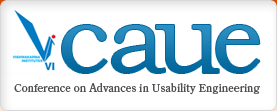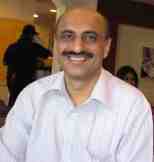 What: A 3-hour, free event for World Usability Day, and a 2-day, paid conference on usability engineering, both featuring the who’s who of Usability in Pune, and some experts from outside too.
What: A 3-hour, free event for World Usability Day, and a 2-day, paid conference on usability engineering, both featuring the who’s who of Usability in Pune, and some experts from outside too.
When: World Usability Day event is from 3pm to 6pm on Nov 27th; The Conference on Advances in Usability Engineering is on Nov 27th and 28th, full day.
Where: Sumant Mulgaonkar Auditorium, ICC towers, 403-A, Senapati Bapat Road. Map.
Registration and fees: The World Usability Day event is free for all to attend, and no registration is required. The full conference fees are Rs. 3500 for professionals, Rs. 2000 for academics, and Rs. 500 for students. Details here.
Details – World Usability Day Event
A gathering of usability practitioners is organized with many participatory community events to encourage informal discussion, knowledge sharing and networking. Usability professionals, user experience designers, design teachers, IT professionals, managers, software developers, students etc. are welcome to attend.
This event will consist of the following:
Photo Essay Competition on ‘Usability in Transportation’
The participants of this competition are expected to highlight usability problems and difficulties faced by people using a series of photographs and apt description of possible solutions. The photographs have to be focusing on any of the usability problems pertaining to transportation in terms of design of vehicles, transportation systems, traffic signals, road signage systems and communication, journey booking systems, etc. It should also touch upon design, engineering, social, cultural and ergonomic issues related to transportation.
Jury members for Photo Essay Competition
Dr. Sanjay Tripathi, Senior Consultant (Usability), TechMahindra Ltd, Pune -Chairman
Bhakti Khandekar, Principal Designer-User Interface , Infosys Technologies, Pune -Member
Taral Kulkarni, Senior Usability Engineer, Persistent Systems Ltd., Pune -Member
Kedar Kadam, Usability Engineer , Persistent Systems Ltd., Pune -Member
Usability Quiz
It is going to be a fun quiz contest to test our know-how of usability. The quiz will cover questions related to web-usability, user centered design process, human factors, user experience design etc. The best answer for each question will be awarded! So come prepared for the Usability Quiz!
Quiz Coordinators
Ganesh Gaikwad, Principal Human Factors Engineer, Symantec, Pune
Atul Manohar, Lead User Experience Management Practice , Satyam Computer Services , Ltd. Pune
Nagesh Susarla, Manager / Principal UI Designer, Symantec Pune
Shashank Deshpande, Director , Clarice Technologies , Pune.
Panel Discussion on ‘Multi-disciplinary Perspectives of Usability’
Whose property is it anyway? Engineering, Design, Management, Psychology, Ergonomics ?
It is an interactive deliberation between panelists and participants to understand the difficulties faced by those who aspire to practice usability. Following panelists will represent different domain perspectives of usability.
Panel Moderator :
Dr. Dinesh Katre, Group Head- Human Centred Design and Computing, C-DAC, Pune
Panelists :
Dr. Pradeep Yammiyavar, DoD, IIT, Guwahati – Psychology
Dr. Neela Rajhans, Professor, College of Engineering, Pune -Ergonomics
Prof. Pradeep Pendse, Dean IT/Business Design , Welingkar Institute, Mumbai. -Management
Prof. Aniruddha Joshi , Associate Professor , IDC , IIT , Mumbai. -Design
Mr. Sameer Chabukswar, Head, Usability Engineering, Persistent Systems Ltd. Pune -Engineering
Details – Conference on Advances in Usability Engineering
Normally, we at PuneTech do not feature information about paid workshops, trainings, or conferences. But every once in a while, an event comes along which appear to have exceptional technical content, which in our subjective opinion makes it worth the money. The Conference on Advances in Usability Engineering, 2008, hosted by Vishwakarma Institute of Information Technology, is one such event, where the impressive list of speakers, and the detailed schedule makes us feel that this could be a good event to attend. (Please note: PuneTech is a purely non-commercial website and does not take any considerations (monetary or otherwise) for any of the content on the site. Decision to feature content on the site is made by the editors purely on the basis of interestingness and technical content.)
Broad themes of the conference:
Offshore Usability
Cross-cultural aspects, remote usability methods and tools, challenges in user requirements research, etc.
Usability to Bridge the Digital Divide
Designing ICT products and applications for rural users, such as e-governance, e-learning, localization of user interface.
Usability Engineering
Institutionalisation, processes & practices, multidisciplinary dimensions, best usability practice, impact of adaptation of user centred design approach in SDLC process and project management, agile process, interaction design and client architecture, internationalisation of user interface, etc.
User Experience Design for New Media
Web, Mobile, PDA, Touch-screen, new interaction models, interaction design for development, etc.
User Experience Research
Tying user experience to strategic business innovation objectives, UX methods and research approaches for emerging markets with unique technology adoption curves, user experience innovations for Indian consumer and enterprise products, next generation user-driven technologies, etc.
Multidisciplinary Challenges of HCI in Education
Fusion of diverse disciplines in the syllabus of Human-Computer Interaction, user experience design thinking into the design / engineering / management curriculum, etc.
If you are not familiar with Usability, or not convinced as to why it is such a vitally important field of study, check out past PuneTech articles on usability.
 This post by Pradnya Naik explains what Acad DevCon 2009 is, and why you should attend, and is reproduced here with permission.
This post by Pradnya Naik explains what Acad DevCon 2009 is, and why you should attend, and is reproduced here with permission.![Reblog this post [with Zemanta]](http://img.zemanta.com/reblog_b.png?x-id=3d21ac14-2752-4732-abad-3ca325209571)

![Reblog this post [with Zemanta]](http://img.zemanta.com/reblog_b.png?x-id=2a7cbbe0-9463-4ff1-9eca-68ca2383fbaf)

![Reblog this post [with Zemanta]](http://img.zemanta.com/reblog_b.png?x-id=e1e0ee10-1c89-43cf-8c54-1708e72768be)
![Reblog this post [with Zemanta]](http://img.zemanta.com/reblog_b.png?x-id=d9199c5b-645f-411e-ba75-dd063b8bc314)
![Reblog this post [with Zemanta]](http://img.zemanta.com/reblog_b.png?x-id=f0bdac66-ff8f-4c02-9c0c-cf0240f0b2a5)

![Reblog this post [with Zemanta]](http://img.zemanta.com/reblog_b.png?x-id=45d6e635-e6a7-436f-b1e5-bc624d74df4b)

